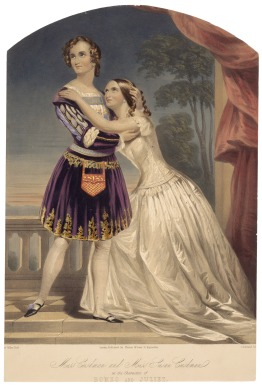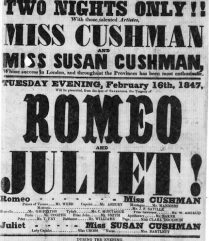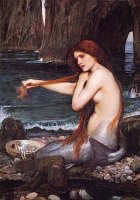H i, I’m JL Merrow, and today, 17th May, is the International Day Against Homophobia, Transphobia, and Biphobia
i, I’m JL Merrow, and today, 17th May, is the International Day Against Homophobia, Transphobia, and Biphobia
I’m delighted to be blogging here at the Macaronis today as part of the Hop For Visibility, Awareness and Equality.
Among the many fascinating exhibits in the British Library’s Shakespeare in Ten Acts exhibition is the story of lesbian actress Charlotte Cushman from Boston, Massachusetts, who has been described as the first native-born star upon the American stage.
In 1846 she crossed the Atlantic to appear on the London stage in Romeo and Juliet—but not in a female role.
 London theatre audiences of the time were notoriously conservative—after all, it was only 40 years since Sarah Siddons, playing Lady Macbeth, had caused a sensation by putting down a candlestick when tradition dictated it should be held throughout a scene. Playwright Richard Sheridan was apparently so horrified by the prospect he actually visited her in her dressing room to try to get her to abandon such a dangerously avant-garde idea, although he changed his mind when he saw the performance.
London theatre audiences of the time were notoriously conservative—after all, it was only 40 years since Sarah Siddons, playing Lady Macbeth, had caused a sensation by putting down a candlestick when tradition dictated it should be held throughout a scene. Playwright Richard Sheridan was apparently so horrified by the prospect he actually visited her in her dressing room to try to get her to abandon such a dangerously avant-garde idea, although he changed his mind when he saw the performance.
So how might an accomplished actress, tired of—and in some ways ill-suited to—playing the limited female roles available at the time circumvent all tradition and convention to take on a male role?
How, in particular, might she persuade an audience to accept cross-dressed casting of one of the most famous of Shakespeare’s characters, the eponymous lover, Romeo?
In an inspired move, Miss Cushman—known for her strong features and deep (for a woman) voice, not to mention her independence of spirit—gave out the story that she took on the role of Romeo to protect her Juliet from the unwanted attentions of male actors. The role of Juliet was taken by Charlotte’s younger sister Susan, who had been abandoned by her husband and lately involved in a romantic scandal. How could anyone object to the preservation of female virtue?
 And in fact the casting brought a whole new dimension to the role. Charlotte Cushman’s masculine femininity was well suited to playing a young man whose masculinity was perceived as having something effeminate about it. Romeo’s immaturity, and in particular his emotional immaturity, led the role to be seen as one not easily portrayed by a mature male actor of the era—or at least, not without embarrassment. Women, however, were popularly supposed to be naturally over-emotional and impetuous, and so a woman’s portrayal of the young lover was, in some ways, actually more credible to nineteenth-century audiences.
And in fact the casting brought a whole new dimension to the role. Charlotte Cushman’s masculine femininity was well suited to playing a young man whose masculinity was perceived as having something effeminate about it. Romeo’s immaturity, and in particular his emotional immaturity, led the role to be seen as one not easily portrayed by a mature male actor of the era—or at least, not without embarrassment. Women, however, were popularly supposed to be naturally over-emotional and impetuous, and so a woman’s portrayal of the young lover was, in some ways, actually more credible to nineteenth-century audiences.
Precedent established, Charlotte Cushman went on to play Romeo to at least two other Juliets—with both of whom she was romantically linked. And she didn’t just stick with the “effeminate” heroes: in her career she played over 30 male roles, including that of Hamlet, often seen as the loftiest endeavour of an actor’s career.
That she was able to do so is a tribute not only to her ability as an actor, but also to her tenacity, business savvy and, not least, her skill and pragmatism at working a system that was stacked against women.
See also: the British Library’s excellent Shakespeare in Ten Acts exhibition: http://www.bl.uk/events/shakespeare-in-ten-acts (on until 6th September 2016).
***
PRIZE: I’m offering an ebook of the winner’s choice from my historical backlist to a randomly chosen commenter on this post, and I’ll make the draw after the hop ends on May 24th. There will be lots of other prizes up for grabs on the hop, so make sure you check out the other participating blogs!
 JL Merrow is that rare beast, an English person who refuses to drink tea. She read Natural Sciences at Cambridge, where she learned many things, chief amongst which was that she never wanted to see the inside of a lab ever again. Her one regret is that she never mastered the ability of punting one-handed whilst holding a glass of champagne.
JL Merrow is that rare beast, an English person who refuses to drink tea. She read Natural Sciences at Cambridge, where she learned many things, chief amongst which was that she never wanted to see the inside of a lab ever again. Her one regret is that she never mastered the ability of punting one-handed whilst holding a glass of champagne.
JL Merrow is a member of the Romantic Novelists’ Association, International Thriller Writers, Verulam Writers’ Circle and the UK GLBTQ Fiction Meet organising team.
Find JL Merrow online at: www.jlmerrow.com, on Twitter as @jlmerrow, and on Facebook at http://www.facebook.com/jl.merrow





May 17, 2016 at 12:19 pm
[…] I’m also offering an ebook of the winner’s choice from my historical backlist to a randomly chosen commenter on the post over at the Macaronis. […]
May 17, 2016 at 12:46 pm
Cor. I didn’t know that!
Am I dreaming – in Nicholas Nickleby, when he joins the stage company, do the young ladies there not take male parts?
May 17, 2016 at 12:58 pm
I’m not sure I’ve ever read that one all the way through, so you may know better than I. I wonder if Dickens could have seen Miss Cushman on the stage?
On a similar sort of subject, I was literally just reading this rather entertaining piece about Sophie Okonedo playing Margaret of Anjou: http://indy100.independent.co.uk/article/ukip-councillor-attempts-to-blast-bbc-for-historical-inaccuracy-gets-destroyed-by-actual-historian–ZyZAasU2fb
May 17, 2016 at 1:09 pm
Maybe I’m thinking of the stage NN, of course.
Interesting article. I love the unanswerable “It’s called acting” line.
May 17, 2016 at 1:06 pm
[…] It has a new name, a new mission statement but the same excellent intention, of combating some of the misunderstandings and prejudices that pervade our society. There will be lots of cool posts about (keep an eye out for those rainbow umbrellas) and I’ll be sharing some of them, especially the ones at the Macaronis. ‘s there today, talking about a pair of daughters on the Victorian stage. […]
May 17, 2016 at 1:47 pm
Wow, that’s amazing. I assumed quite wrongly that I’d be reading a story of a woman who disguised herself as a man to get the roles she wanted.
Brilliant post.
May 17, 2016 at 6:59 pm
Yes – nice to know it wasn’t always necessary! 😉
May 17, 2016 at 1:59 pm
such a facinating post. thank you for sharing
May 17, 2016 at 6:59 pm
You’re welcome! 🙂
May 17, 2016 at 4:09 pm
I never knew about Cushman before…she sounds awesome!
May 17, 2016 at 6:59 pm
Doesn’t she just? 🙂
May 17, 2016 at 5:59 pm
Fantastic story! Now there’s an historical person I would love to meet. Thank you for sharing this and for participating on the blog hop.
May 18, 2016 at 9:42 pm
You’re welcome! 🙂
May 17, 2016 at 7:07 pm
I don’t know that I can remember another actress playing men’s roles like this, except in modern times (and then only occasionally). I’ve always liked to imagine the confusion which was caused by boys playing women who were pretending to be men in the early performances of Shakespeare’s plays, and wondered whether there was some token which they wore or carried to indicate which gender they were meant to be at any given moment.
Do we know if Charlotte Cushman liked playing men for any reason other than the limited number of roles available for women?
May 17, 2016 at 7:26 pm
I’d imagine it was not just the limited number, but the limited range of female roles which made Cushman want to branch out. Then – as now in films – it would have been all too often the men who got to do the interesting stuff, while women were relegated to supporting characters.
And yes, I’m sure Shakespeare wrote a lot of his female roles with the knowledge they’d be played by boys very much in the forefront of his mind – I bet there wouldn’t have been half so much cross-dressing going on without that! 😉
I recently saw an all-female amateur production of An Inspector Calls, which was very well done. The actors playing male roles – all in their teens – did an amazing job of portraying 3 very different masculine types. (The inspector was re-written as female).
May 18, 2016 at 8:08 am
This reminds of school drama! (I was at an all-girls school.) This is why I know how to tie a real bow-tie.
May 18, 2016 at 8:22 am
It was put on as a private project by the daughter of a friend of mine, and the actresses were, I think, mainly from her former school, which is all-girl. So perhaps that’s where they learned to play male roles so well! 🙂
May 17, 2016 at 7:14 pm
Thanks for a really interesting post!
May 17, 2016 at 7:17 pm
❤
May 18, 2016 at 3:33 am
Never heard of Cushman before. This was such an interesting post. Thank you for sharing this info =)
May 18, 2016 at 1:35 pm
You’re welcome! 🙂
May 18, 2016 at 6:11 am
This is pure gold, and goes to show that there were always people who managed to work the system in their favor.
May 18, 2016 at 1:35 pm
I just love that pragmatic approach! 🙂
May 18, 2016 at 11:33 am
That was interesting; always good to read there were positive outcomes in history.
May 18, 2016 at 1:35 pm
❤
May 18, 2016 at 1:55 pm
Oh, wow! I never knew that. All the things they *don’t* tell you when you study Shakespeare in school and why they absolutely should.
May 18, 2016 at 1:57 pm
Like nobody ever told us that “Shall I compare thee to a summer’s day” was addressed to a man. Or that Wilfred Owen wrote poems about rent boys.
May 18, 2016 at 2:03 pm
Yes! When I was in school, no one ever talked about anything except the heterosexual relationships of renowned writers. When I learned the truth, I was *angry* that we were denied this part of our community’s history. And it’s still happening. I’m glad that at least I know enough to share these vital parts of history with my own kids, but not every young person has parents who even know, let alone are willing to talk.
May 18, 2016 at 8:31 pm
That was a really interesting post, Jamie. I guess sometimes people who cannot accept one thing can accept a supposedly worse one if it comes with the right disguise… LOL! Thank you for putting a smile on my face today! 😉
May 18, 2016 at 9:42 pm
Heh, yes, it’s all about spin, isn’t it? Glad you enjoyed! 😀
May 18, 2016 at 8:46 pm
That was a really interesting post. I guess sometimes people who cannot accept one thing when they must face it can easily accept the same thing when it comes with the appropriate disguise. Thank you for the post, Jamie!
May 19, 2016 at 7:02 am
I do not know why my post is duplicated. Sorry! 😦
May 19, 2016 at 3:45 pm
No worries! 🙂
May 19, 2016 at 11:42 am
Thank you for taking part in the Hop!
May 19, 2016 at 3:45 pm
❤
May 19, 2016 at 3:36 pm
Fascinating history–thank you!
May 19, 2016 at 3:45 pm
You’re welcome! 🙂
May 27, 2016 at 10:05 pm
I’ve now made the draw and the winner is jenf27, who I’ve emailed re the prize – congrats to her, and thanks to everyone who commented. 😀